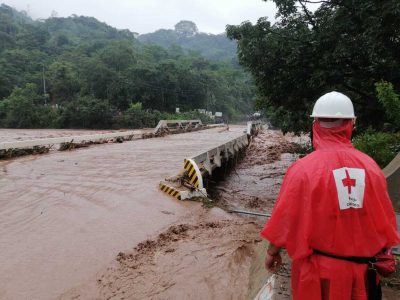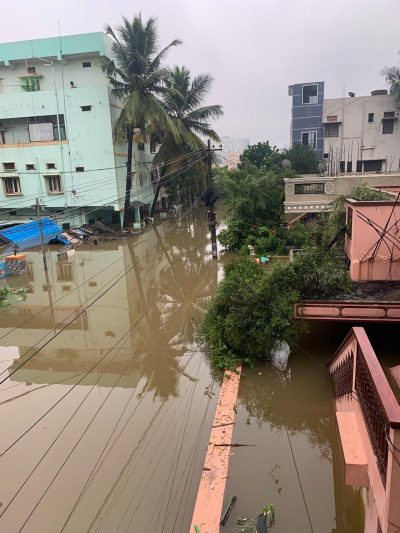One of the aspects of the Disaster Lab research that has been most compelling has been the diversity around the term “disaster” itself. The Oxford English Dictionary describes a disaster as “An event or occurrence of a ruinous or very distressing nature; a calamity; esp. a sudden accident or natural catastrophe that causes great damage or loss of life.” The Canadian Disaster Database, which has been a main source of information for this project, defines disasters according to loss life and financial cost to the federal government of Canada. In this regard, the largest loss of life recorded in the CDD comes from the flu epidemic in 1918-1920. The most expensive was the 1998 ice storm that hit New Brunswick, Ontario and Quebec.

Photo Credits: Luc Alary / Canadian Red Cross
The interesting thing about efforts to define, sometimes very narrowly, the term “disaster” is that it is easy to lose sight of the myriad ways the term is used socially and culturally, beyond legal dictionary definitions of the term.
As a way of recognizing the diversity of casual ways the term “disaster” is used in our common parlance, our team recently explored two years of the Globe and Mail, from June 2020 to June 2022, to see when and how the term disaster was being used. We were especially interested in seeing if, and how, the term was used in terms of migration.
Our research returned 147 articles, the vast majority of which used the term disaster in relation to environmental tragedies and the Covid-19 pandemic, including several stories about earthquakes, tropical storms, and flooding. Others related to music (retrospective on 1984 Band-Aid effort for Ethiopia) or films (Michael Bay’s new movie) that had used the term as well as to economic situations, riots, humanitarian aid, airplane crashes. There were also a number of 10-year anniversary stories related to the meltdown at the Fukushima power plant following an earthquake and tsunami that hit Japan in 2011.

Photo Credits: IFRC
Journalists adopted varying approaches to the question of disasters and the extent to which broader contemporary and historical developments were highlighted to move away from the immediacy of a particular event. Having said that, In some cases, only the headings used the term disaster as was the case for the article “Russia jails five people in connection to coal-mine disaster that killed 51,” published in November 2021.[1] We also found evidence of stories to forest fires in Greece, for instance, that never used the term disaster but evoked “devastating” and “apocalyptic” situations instead.[2] In other instances, disasters were contextualized against other developments. For example, a discussion of a magnitude 7.2. earthquake that hit Haiti in August 2021 juxtaposed the earthquake against other challenges in the country, “And this disaster coincides with political instability, rising gang violence, alarmingly high rates of malnutrition among children, and the COVID-19 pandemic – for which Haiti has received just 500,000 vaccine doses, despite requiring far more.”[3]
The other fascinating observation we made was that vast majority of articles that referenced the term disaster did so in the context of Canada. Geographically, fifty stories covered developments in the United States of America, Japan, Russia, the UK, Spain, Yemen, the People’s Republic of China, Sri Lanka, the Central African Republic, Afghanistan, Haiti, Somalia, St. Vincent and the Grenadines, Lebanon, and Afghanistan.
A total of ninety-seven articles discussed disasters in Canada.

Hyderabad India Flood October 2020. Publicly sourced.
Often the mention of Canada was in terms of money. One article discussed a request from Somaliland in April 2022 for humanitarian aid following a fire that ravaged the Hargeisa, its largest commercial market. The appeal was made to the federal government, Canadians and especially members of the diaspora. The event was described as “We’re dealing with a catastrophic disaster that will negatively impact thousands and thousands of people who are already deemed vulnerable and are at risk to begin with.”[4]
Another article, under the headline, “Why do floods cost Canada so much?” pointed to flooding as the most expensive of the disasters that the country, namely the federal government, must contend with. The article detailed relief programs in the country and then noted the “chilling cost of inaction.”[5] This was a recurring theme as other articles emphasized the importance of proactive interventions, such as protecting watersheds: “Watersheds underpin our economy, health and well-being by providing clean drinking water, thriving salmon runs, water for growing food and natural protections against climate disasters.”[6]
This geographic focus on disasters in Canada, particularly environmental ones, was in some ways surprising. Even though we were using a national newspaper for our analysis, the expectation was that the term “disaster” would largely be used to discuss events abroad, echoing in part the Global North / Global South divide and the perception that environmental refugees, for instance, come from away.
The comfort and ease with which journalists in The Globe and Mail used the term suggests that the ground is already fertile for thinking about disasters and migration as a domestic concern. The select coverage of events from the Globe and Mail that we analyzed here certainly speaks to a sense of disasters happening in Canada as well as elsewhere, enjoining events in Canada with some of the most pressing issues of our time.
– Dr. Laura Madokoro
[1] Dasha. Litvinova, “Russia jails five people in connection to coal-mine disaster that killed 51,” The Globe and Mail, 29 November 2021, B3.
[2] Angeliki Koutantou and Lefteris Papadimas, “Greece fights fires for third day as heat fans flames, The Globe and Mail, 6 August 2021, A5.
[3]Mark Stevenson and Evens Sanon, “Haiti quake deaths rise to more than 1,400,” The Globe and Mail, 17 August 2021, A3.
[4] Safiyah Marhnouj, “Somaliland calls for emergency funding: Self-declared state asks for $10-million from Ottawa after a fire ruins Hargeisa market,” The Globe and Mail, 29 April 2002, A8.
[5] “Why floods cost Canada so much,” The Globe and Mail, 04 June 2022, O10.
[6] Coree Tull, “Weather disasters require bold investment in watershed security,” The Globe and Mail, 13 May 2022, A6.